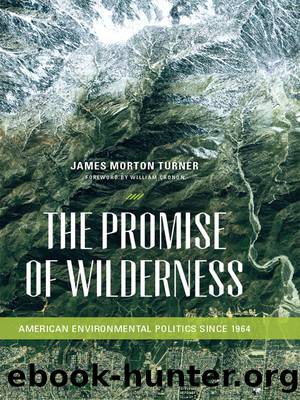The Promise of Wilderness by Turner James Morton;Cronon William;

Author:Turner, James Morton;Cronon, William;
Language: eng
Format: epub
Publisher: University of Washington Press
Concern about the economics of public lands management was not new in the 1980s. Marion Clawson, a resource economist who had grown up on a Nevada ranch and trained as an agricultural economist, pioneered this line of analysis in the postwar era. He brought to public lands policy a rural westerner's belief in resource development and an economist's emphasis on efficiency. Working with Resources for the Future, a think tank based in Washington, D.C., Clawson focused attention on the economics of public lands management, especially national forest management. His work addressed a range of issues: the inefficiencies of congressional oversight and budgeting, the increased cost of forest management due to administrative and legal appeals, and the overhead necessary to involve the public in policy making. He also documented the Forest Service's failure to fully account for the costs and benefits of public lands management, including clean water, wilderness, and recreation. If the public lands were to be managed efficiently, he thought, the inputs and outputs had to be reduced to economic terms.6 Although Clawson was not a wilderness advocate, he argued that for groups like the Wilderness Society and Sierra Club, âan approach based upon the economicsâ¦will do more to help these interests attain what they want from the national forests than will exclusively emotional appeals.â7
If Clawson's goal was to get people to rethink the economics of public lands management, he succeeded. It is unlikely that he anticipated that the Wilderness Society would carry his campaign forward with particular enthusiasm. But the Wilderness Society's agenda hinged on the work of its economists and policy analysts in the 1980s. In 1981, Turnage had secured a grant to create an Economic Policy Department from the Richard King Mellon Foundation. That unit had been instrumental in fending off the Reagan administration's anti-environmental campaigns. In 1985, the Wilderness Society expanded the department into a new Resource Planning and Economics Department (RP&E) with the specific purpose of monitoring the new national forest planning process.8 From the start, there had been concern that the Wilderness Society's new direction would take the organization away from its core focus on wilderness. In 1981, George Marshall, brother of Robert Marshall, had noted that the Mellon Foundation's initial grant for the Economic Policy Department addressed ââresource economics, management, and forestry,â but not a word about wilderness.â9 Marshall's concerns were well placed. As the RP&E emerged as the most dynamic and productive engine within the Wilderness Society, the organization issued dozens of technical analyses, such as America's Vanishing Rain Forest: A Report on Federal Timber Management in Southeast Alaska (1986), Below-Cost Sales: Proceedings of a Conference on the Economics of National Forest Timber Sales (1987), and National Forests: Policies for the Future (1988).10 None focused specifically on wilderness protection.
Such studies raised one overarching question: Why did the federal government lose money on many of the extractive activities on the public lands? The government frequently spent more taxpayer funds to administer logging, grazing, and mining programs than it recouped in receipts from timber sales, fees from ranchers, or land sales to mining companies.
Download
This site does not store any files on its server. We only index and link to content provided by other sites. Please contact the content providers to delete copyright contents if any and email us, we'll remove relevant links or contents immediately.
The Lonely City by Olivia Laing(4565)
Animal Frequency by Melissa Alvarez(4147)
All Creatures Great and Small by James Herriot(3980)
Walking by Henry David Thoreau(3681)
Exit West by Mohsin Hamid(3632)
Origin Story: A Big History of Everything by David Christian(3470)
COSMOS by Carl Sagan(3346)
How to Read Water: Clues and Patterns from Puddles to the Sea (Natural Navigation) by Tristan Gooley(3236)
How to Do Nothing by Jenny Odell(3098)
The Inner Life of Animals by Peter Wohlleben(3097)
Hedgerow by John Wright(3095)
How to Read Nature by Tristan Gooley(3073)
Project Animal Farm: An Accidental Journey into the Secret World of Farming and the Truth About Our Food by Sonia Faruqi(3008)
Origin Story by David Christian(2990)
Water by Ian Miller(2950)
A Forest Journey by John Perlin(2907)
The Plant Messiah by Carlos Magdalena(2745)
A Wilder Time by William E. Glassley(2686)
Forests: A Very Short Introduction by Jaboury Ghazoul(2667)
